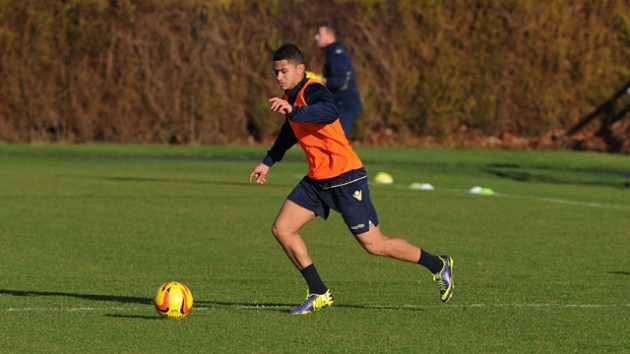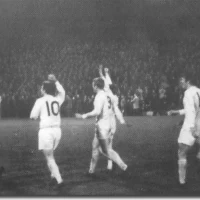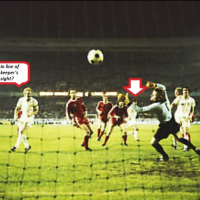
Bellusci: “Posso negare il razzismo!“
The latest news on the latest Cameron Jerome “racial abuse” claims: Leeds defender Giuseppe Bellusci will attend in person to put his version of events to an FA disciplinary commission tomorrow – let’s hope that he gets a fair hearing and doesn’t become a victim of “antipodean marsupial justice”. I won’t hold my breath – although the impartiality of football authorities’ judicial proceedings IS coming on in leaps and bounds…
There was a time when corroborative evidence from a third party was required – or at least highly desirable – in order for a charge as serious as racial abuse to be brought against a football player or other alleged offender. Rumour has it that, in some areas of footballing and other jurisprudence, that may even still be the case. But this is Leeds United, so those troublesome little considerations needn’t apply – or so it increasingly seems.
Whatever the moral and legal ins and outs, the FA have looked into a complaint by Cameron Jerome of Norwich City FC against Giuseppe Bellusci of Leeds. Jerome alleges racist language. Bellusci hotly denies any such thing. Who is to say which man is telling the truth? It could even be that the whole thing is an unfortunate misunderstanding across the language barrier – see below. But, leaving all of these problems aside, the FA are prepared to make a case of it, despite the hideous difficulty of establishing the truth when Party A alleges something, Party B denies it (Beh, è il vostro diritto di negare questa accusa, Giuseppe, non è vero?)* – and there is no Party C to swear true from false.
* The Italian phrase above means (as nearly as Google translate allows me to render it) “Well, it’s your right to deny this accusation, Giuseppe, isn’t it?” You may notice how I have subtly emphasised the word “negare“, meaning “deny”. Apparently, one plank of Bellusci’s defence is that, after being elbowed by Mr Jerome and then being treated to a volley of ripe abuse by that gentleman, he remarked to him quite calmly, in Italian, whilst pointing at his own neck “You can’t deny the elbow”.
If this is true, and if Jerome (whose Italian may not be exactly fluent as Serie A clubs have managed somehow to resist signing him thus far) has simply mistaken the word “negare” as something racially sinister – then, in the absence of any corroborative evidence either way, it’s very hard to see how a fair-minded, competent authority could possibly find against Signor Bellusci. That’s not to say, of course, that the FA will have any such difficulty, particularly as this is another golden opportunity for the football powers that be to have another swipe at nasty old Leeds, much to the delight of rival fans, gutter press hacks and other such morons everywhere. But that plank of the Leeds man’s defence appears, on the face of it, to be fairly stout.
It’s a pretty dicey situation, this. These are troubled, even shark-infested waters. The FA may feel that racism is such a topical hot potato that, where an allegation is made, a charge should follow as night follows day, lest they be thought of as sweeping things under the carpet. That, however, doesn’t entitle them to dispense with good old English precepts like “innocent until proven guilty” – nor yet the even older Latin one about prima facie evidence.
In the glaring absence of any corroboration whatsoever, and with the intriguing possibility of a tragic misunderstanding as outlined above, it’s genuinely difficult to see how the charge against Bellusci can be proven – even under the less legally exacting ‘balance of probabilities’ test that applies in non-criminal cases. Or, to put my paranoid hat back on, might the allegedly august governing body hold that, as the player is on the books of the Damned United, he’s more likely than not a wrong’un – and find accordingly against him? Tread carefully, chaps. There will be some pretty sharp lawyers out there watching your every step down the crooked path you might be tempted to follow. Ask Shaun Harvey over at the League about that.
Leeds United AFC, it warms my heart to confirm, are standing four-square behind their man, and for solid and grounded reasons – namely: the player consistently denies the allegation; and there is no independent confirmation of what was, or wasn’t, said. Certain Norwich City supporters have taken to Twitter and hormonally demanded that Leeds United should be summarily liquidated for this stance. I can only clap my face to my palm in despair and recommend that such very un-cerebral people might benefit from an elementary law course, a session watching “Petrocelli” or maybe a somewhat larger gene pool – quite possibly all three. Not, of course, that I would wish to be in any way Wurzellist or yokellist here.
As ever with Leeds United and their frequent brushes with the game’s authorities, it’s not possible to predict any outcome with any degree of confidence. But, given the apparent and hard-to-dispute facts of this case, surely there would have to be an excess of stupidity, malice and vindictiveness for the decision to go against Bellusci. Then again, it wouldn’t be the first time that has happened…
The sad fact is that we are in a mess largely of our own making in that football governing bodies and fans organisations alike have tended over the past few decades to recoil in horror at any manifestation of racial prejudice. This has to be A Good Thing, of course – but it can have unfortunate consequences and there is arguably too much room these days for sledgehammers to be employed in the cracking of walnuts.
I’m not advocating any return to the days when a racial slur was tolerated and complainants were advised to take a “sticks and stones may break my bones” approach. It is tempting to wonder, though, what the likes of Cyrille Regis and Viv Anderson feel about the current squeamishness over name calling by the ignorant, as compared with what they had to go through in their seventies heyday – having bananas thrown at them, and other disgusting manifestations of brainless and moronic behaviour. What of our own late and lamented Albert Johanneson, who was staggered to find that he was allowed in the communal bath with the rest of the players, so used was he to being considered a second-class citizen where he grew up. Would our Albert have had a hissy fit over a name he thought he’d heard someone call him? Of course not. It’s all relative, and Albert had come from something far, far worse.
Surely to goodness, there’s a sane and happy medium somewhere? The experience of the past few years seems to be that it’s far too easy for allegations of racism to be made over hasty and possibly misapprehended words, exchanged in the heat of battle. If racial abuse can be demonstrated and if proof is at hand, then the offender should be dealt with accordingly – and in a manner to leave him (or her) in absolutely no doubt as to the inadvisability of such childish and ignorant carrying-on. But kangaroo courts hearing trumped-up charges based on uncorroborated and very possibly flawed statements – that’s a dangerous path to tread, and not one calculated to lead to increased harmony in our increasingly multi-cultural leagues. Whatever next? Will we see some hapless and brainless defensive midfielder hauled up on charges of being gingerist or stoutist? Just how stupid is the game prepared to make itself look?
Verbal abuse (whether racially-motivated or not) if it’s going to be the basis of disciplinary charges, needs to be at the most deeply offensive end of the scale – and it needs to be witnessed to such a degree as to make denial implausible. Otherwise, we’re going to continue with this spate of “name-calling” charges, and it’ll be open season on any hothead who lets his gob run away with him when tensions rise out there on the park. This would do no person and no cause any good at all – it would serve merely to trivialise something potentially highly damaging to the whole of sport and indeed society at large.
Here’s hoping that this current situation was the product of a misunderstanding, that both parties can be satisfied this is the case – and that the FA can conduct an urgent root and branch review into the standard of evidence and corroboration required before its wheels of justice start to grind. There is a very real danger here that our national sport’s venerable governing body might just end up looking even more stupid and out-of-touch than usual.




























